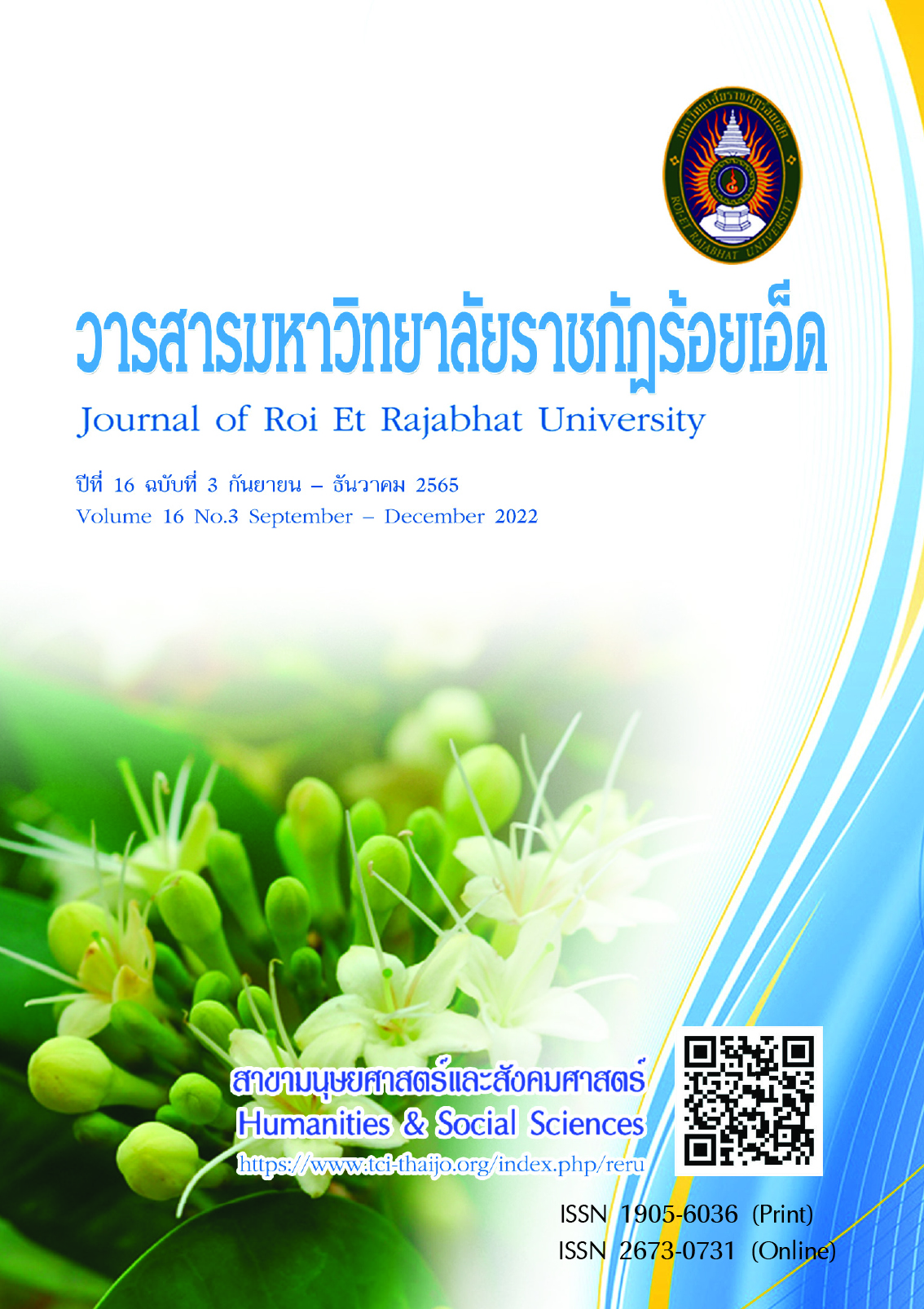The study of the principles of use of "Meili, Piaoliang, Haokan" comparable to "Gorgeous, Beautiful, Good-looking" in Thai Lanuage
Keywords:
Gorgeous, Beautiful, Good-lookingAbstract
Chinese teaching for international students studying Chinese as a second language, especially Thai learners, the term “Meili Piaoliang and Haokan”. These three words in Chinese, despite their similar meaning, but in some situations it is not interchangeable. In addition, “Meili Piaoliang and Haokan”
also has other meanings than the main meaning. Therefore, this academic article had purposes to stuty the use of “Meili Piaoliang and Haokan” and compare it to “Gorgeous Beautiful and Good-looking”
In Thai language. Data collection related to “Meili Piaoliang and Haokan” from Peking University’s Chinese archives and “Gorgeous Beautiful and Good-looking” from The National Thai Archives to see how often these three adjectives were used, and collected sample sentences in both Chinese and Thai to perform
a grammatical position and function comparison analysis having meaning other than the main meaning. The result showed that “Meili Piaoliang and Haokan” comparable to “Gorgeous Beautiful and Good looking”, these three words were sometimes not always comparable in terms of meaning and grammar. The authors hope that this article will be able to help those who are starting to learn Chinese to continue to understand and use these three synonymies correctly.
References
จรรยา ชัยวัฒนางกูร. (2551). แผนรักร้ายกลอุบาย...กับหัวใจสองดาว. สืบค้นเมื่อ 23 มกราคม 2565,
จาก https://www.arts.chula.ac.th/ling/tnc3/
นงไฉน ปริญญาธวัช. (2551). ธรณีนี่นี้ใครครอง. สืบค้นเมื่อ 23 มกราคม 2565, จาก https://www.arts.chula.ac.th/ling/tnc3/
เธียรชัย เอี่ยมวรเมธ. (2562). พจนานุกรมจีน - ไทย ฉบับใหม่ (พิมพ์ครั้งที่ 21). กรุงเทพฯ: รวมสาส์น (1977).
สุภาณี ปิยพสุนทรา. (2553). รวมคอลัมน์ของสุภาณี ปิยพสุนทรา นิตยสารพลอยแกมเพชร. สืบค้นเมื่อ 23 มกราคม 2565, จาก https://www.arts.chula.ac.th/ling/tnc3/
卢惠惠. (2011). 现代汉语词汇学. 上海:学林出版社.
殷梅、孟繁杰. (2003). การศึกษาวิเคราะห์เปรียบเทียบภาษาจีน“美丽”、“漂亮”กับ “beautiful”、
“pretty”. 青岛科技大学学报(社会科学版)
李明月. (2014). 对外汉语教学中的同一单双音节形容词研究.扬州:扬州大学
硕士学位论文.
中国社会科学院语言研究所词典编辑室. (2012). 现代汉语词典(第6版). 北京:
商务印书馆.
Center for Chinese Linguistics of Peking University(北京大学中国语言学研究中心).“美丽”、
“漂亮”、“好看”. สืบค้นเมื่อ 20 กันยายน 2564, จาก http://ccl.pku.edu.cn/
Corpus Online(国际汉语教学助手网). “美丽”、“漂亮”、“好看”. สืบค้นเมื่อ 18 ตุลาคม 2564,
จาก http://www.aihanyu.org/cncorpus/index.aspx
于久惠. (1991). 《粉红色的梦》节录: 时代文艺出版社. สืบค้นเมื่อ 18 ตุลาคม 2564,
จาก http://corpus.zhonghuayuwen.org
马瑞芳. (1985). 《“假如我很有钱……”》: 报告文学编辑部. สืบค้นเมื่อ 18 ตุลาคม 2564,
จาก http://corpus.zhonghuayuwen.org
阿英. (1985). 《春风秋雨》节录:上海文艺出版. สืบค้นเมื่อ 18 ตุลาคม 2564,
จาก http://corpus.zhonghuayuwen.org
田森. (1985). 《一位关心改革的热血少年》: 中国青年出版社. สืบค้นเมื่อ 18 ตุลาคม 2564,
จาก http://corpus.zhonghuayuwen.org
张希玉. (1984). 《水果药店》节录: 科学普及出版社. สืบค้นเมื่อ 18 ตุลาคม 2564,
จาก http://corpus.zhonghuayuwen.org
高炜宾、孙洪威.(1979). 《潜伏者的阴谋》节录: 四川人民出版社.
สืบค้นเมื่อ 18 ตุลาคม 2564, จาก http://corpus.zhonghuayuwen.org
冯德全. (2019). 说服孩子的对话:这样说孩子最能接:广西科学技术出版社.
สืบค้นเมื่อ 20 มกราคม 2565, จาก http://www.nstxt.com/book/17167.html
于伶. (1963). 《七月流火》节录: 中国戏剧出版社. สืบค้นเมื่อ 20 มกราคม 2565,
จาก http://corpus.zhonghuayuwen.org/CnCindex.aspx
李绪萱. (1982). 《怪孩子的梦》节录: 辽宁少年儿童出版社. สืบค้นเมื่อ 23 มกราคม 2565,
จาก http://corpus.zhonghuayuwen.org/CnCindex.aspx
作家文摘报. (1993). 《北京人在纽约》报刊. สืบค้นเมื่อ 23 มกราคม 2565,
郝慧宏. (1981). 《梦》节录: 江城编辑部. สืบค้นเมื่อ 23 มกราคม 2565,
Downloads
Published
How to Cite
Issue
Section
License
Copyright (c) 2022 Roi Et Rajabhat University

This work is licensed under a Creative Commons Attribution-NonCommercial-NoDerivatives 4.0 International License.
บทความที่ได้รับการตีพิมพ์เป็นลิขสิทธิ์ของวารสารมหาวิทยาลัยราชภัฎร้อยเอ็ด
ข้อความที่ปรากฏในบทความแต่ละเรื่องในวารสารวิชาการเล่มนี้เป็นความคิดเห็นส่วนตัวของผู้เขียนแต่ละท่านไม่เกี่ยวข้องกับมหาวิทยาลัยราชภัฎร้อยเอ็ด และคณาจารย์ท่านอื่นๆในมหาวิทยาลัยฯ แต่อย่างใด ความรับผิดชอบองค์ประกอบทั้งหมดของบทความแต่ละเรื่องเป็นของผู้เขียนแต่ละท่าน หากมีความผิดพลาดใดๆ ผู้เขียนแต่ละท่านจะรับผิดชอบบทความของตนเองแต่ผู้เดียว





